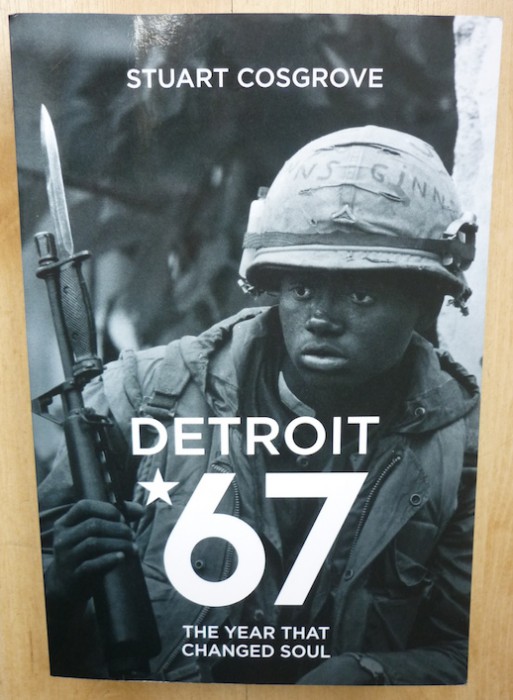Detroit 67
by Stuart Cosgrove
Clayton, paperback, 610 pages. Out now.
Review by Paolo Hewitt.
In the mid 1980s Stuart Cosgrove was sacked by the NME for trying to put erect penises on its cover. As a result he highfooted it back home to Scotland. This was a big blow. Cosgrove’s drive and energy and vision had helped transform the NME. It was now a radical publication, one which pushed soul and socialism and annoyed the hell out of its publishers, IPC. With like-minded writers, the NME had started offering a radical vision of the music world in which the rapper Schooly D was of far more interest than a shoegazing band or Billy Bragg. This intensely annoyed some and inspired many. When the brash and brilliant Cosgrove left, the NME fell back into old habits.
At some point post his NME career, Cosgrove hit upon the great idea of writing a book that forensically examined the city of Detroit in one of its most tumultuous years – 1967.
It was a sharp move. The story is unbelievably rich. Motown, the radical hippie underground, a trigger happy police force, Vietnam, a disaffected young black community, inclement weather, The Supremes, the army, strikes, fiscal austerity, murders, – all these elements coalesced, as Cosgrove noted, to create a remarkable year. In fact, as the book gathers pace, one can’t help think how the hell did this city survive it all?
The book’s main character is Berry Gordy, head of Motown. The change he undergoes in 1967 is the book’s main drive. As the book opens, his main concern is that The Supremes are falling apart no thanks to an exhaustive schedule, his relationship with singer Diana Ross, and the subsequent heavy drinking of founder member, Florence Ballard. Yet this famous girl outfit are not the only ones cracking at the seams. Detroit, this famous town in which some of the greatest ever soul music has been made, (and not just by Motown) is under siege.
Cosgrove tears open the story of John Sinclair and The MC5 and their vicious war with the authorities. He looks at the impact of the Vietnam War on the city’s young black population, the impact of LSD as it spreads amongst the youth, the urban riots that tear the city apart in the summer.
He fastidiously details the murders that take place on an almost daily basis. His beat is the streets, the bars that the disaffected drink in, the areas where the deals go down.
Cosgrove shows us that everyone in Detroit is pushing for something, whether it’s the Mayor trying to keep a lid on things or Motown stubbornly trying to sell themselves as one big happy family. Cosgrove shatters that illusion brilliantly.
The Temptation’s lead singer David Ruffin’s wild drug abuse, his tempestuous relationship with Tammi Terrell and her subsequent collapse onstage with Marvin Gaye, the lead song writing team of Holland, Dozier and Holland, agitating for more money, Florence Ballard’s deepening alcoholism, the suicide of little known lyric writer Roger Penzabene (he wrote the words for the immortal I Wish It Would Rain) Cosgrove details all this and uncovers facts and stories I never knew.
In fact such is the depth and breadth of his research, and the skill of his pen, at times you actually feel like you are in Berry Gordy’s office watching events unfurl like an unstoppable James Jamerson bass line.
At the centre of the book are the four day riots that take place in the city and the subsequent murder of three black males in a seedy hotel named The Algiers, executed by members of the Detroit police force who will all walk free from their subsequent trials. As the recent events surrounding Walter Scott shows us little has changed in the land of the free.
This is an epic work, one in which Cosgrove maintains that Berry’s vision of fully crossing over into white society was no longer sustainable. Police bullets tearing into black flesh had seen off that notion. No longer could Motown issue the best in beautifully crafted pop soul songs that only dealt with affairs of the heart, and leave it at that.
Such was the impact and ferocity and intensity of the events in 1967, Motown had to reflect what was going on in the streets. People expected it. That is why the wonderful single, Dancing in the Streets by Martha and the Vandellas was read as code for rioting in the streets.
I was going to call this a great music book. Certainly, it contains some of the best ever writing and insight about Motown. Ever. But its huge canvas and backdrop, its rich social detail, negate against such a description.
Detroit 67 is a great and a unique book, full stop.
